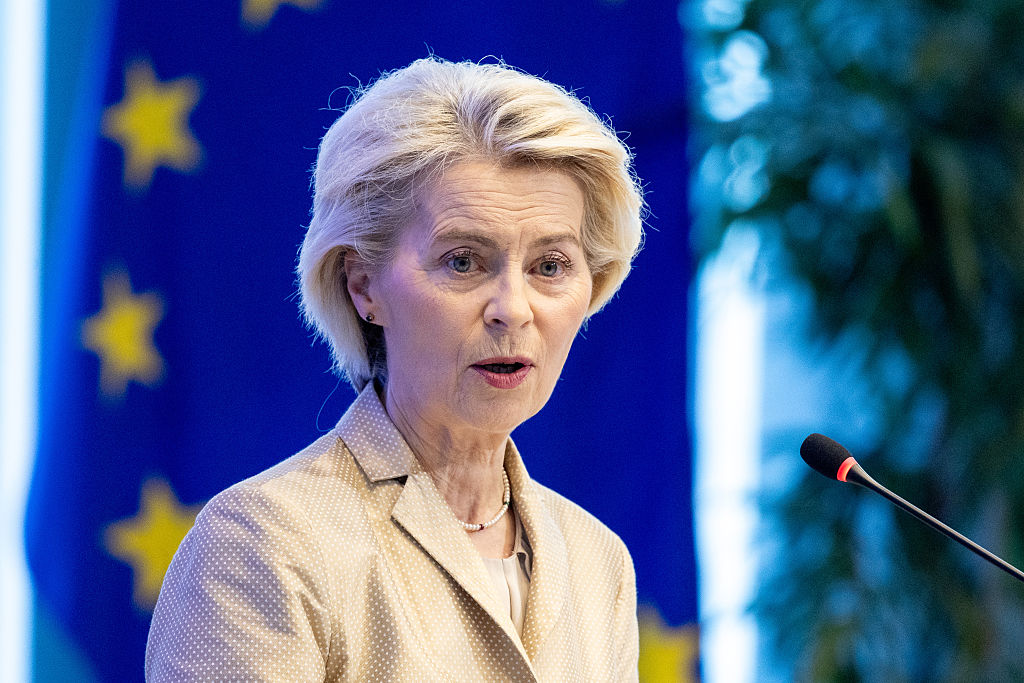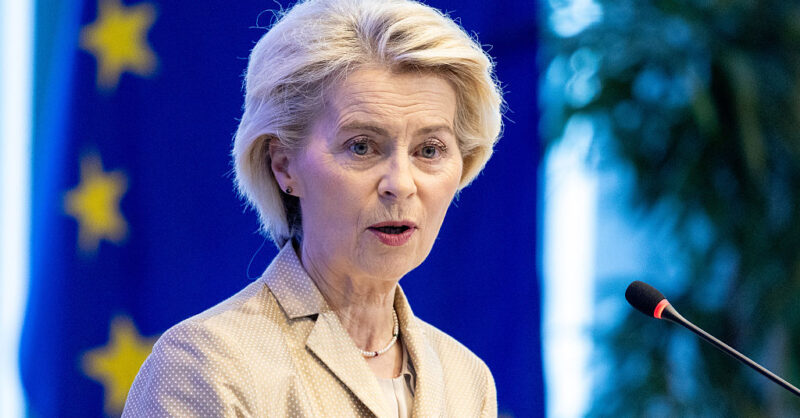
Photo by Omar Havana/Getty Images
In her State of the Union speech to the European Parliament on 10 September, European Commission president Ursula von Leyen proposed to partially suspend the European Union’s association agreement with Israel, which would have the effect of imposing tariffs on Israeli exports to the EU. It has been widely seen as signalling a major shift in the EU’s approach to Israel – after almost two years in which it did not have a policy, the EU finally seemed to be taking meaningful action.
However, von der Leyen’s proposal was just that. It requires the agreement of EU member states to even partially suspend the agreement – and so far Germany and Italy have blocked much more limited sanctions against Israel. In July, as a coalition led by the Dutch foreign minister put increasing pressure on the European Commission to take action, it proposed to exclude Israel from Horizon, the EU’s research and innovation programme. But member states failed to agree to do even this. Last week, on 30 September, German Chancellor Friedrich Merz delayed a decision on sanctions once again.
What makes the EU’s failure on Horizon especially striking is the contrast with the way that the UK was excluded from the programme after it decided to leave the EU. The Trade and Cooperation Agreement, which was signed at the end of 2020 and took effect in 2021, said that the UK could participate in Horizon as an “associated country”. But negotiations stalled over the issue of the Northern Ireland Protocol and it was only after the Windsor Framework was agreed that the UK was finally able to rejoin the programme in 2023 after a two-and-a-half year absence.
In relation to the UK, EU member states were united and empowered the European Commission to take a tough approach. The UK was not accused of anything like genocide as Israel is. But simply by virtue of leaving the EU, it was seen as a threat to it. European leaders insisted they were not punishing the UK for leaving the EU, but were also unanimous that they could not allow Brexit to be a success, because that might encourage other member states to leave.
Israel, meanwhile, joined Horizon as an “associated country” in 2021 after it had signed an agreement with the EU the year before. Article 2 of the agreement states that it is “based on respect for human rights and democratic principles”. Yet even now, after almost two years of Israel’s war of annihilation in Gaza, the EU is unable even to partially exclude Israel from it.
In June, after a European Commission review concluded there were “indications” that Israel was in violation of the association agreement, it began to explore what steps the EU might take. But opposition from some member states, including Germany, Hungary and Italy, meant there was no prospect of suspending the agreement altogether, which would require unanimity – and little prospect of even suspending the trade part of the agreement.
Suspending Israel from Horizon seemed a more realistic option because it was such a limited step that required only a qualified majority – that is, 15 member states and 65 percent of the EU’s population – to agree. But achieving even that was impossible when it was discussed at a meeting of EU ambassadors and then at a meeting of foreign ministers at the end of August. In particular, Germany and Italy remained opposed.
Subscribe to The New Statesman today from only £8.99 per month
In an interview a few days after the meeting, Josep Borrell, the Spanish social democrat who was the EU’s high representative in von der Leyen’s first term, said that it was a “bad joke” that suspending Israel from Horizon was “the only response the European Commission is capable of in the face of what Israel is doing”. He said stronger measures were needed, such as suspending the association agreement altogether.
What the contrast between the EU’s approaches to British and Israeli participation in Horizon illustrates is that its foreign policy, to the extent that it even has one, is not based on “values” as it likes to think. Neither is it strategic – the “geopolitical” EU that many “pro-European” foreign policy experts want it to be. Rather than being values-driven or strategy-driven, it is structure-driven. The European Commission’s role is to protect European integration – and therefore it must see Brexit as a bigger threat than a genocide in Gaza.
Whether, having failed to exclude Israel from Horizon, the EU now agrees to suspend the trade part of the association agreement depends above all on Germany. It is possible that, as Israel continues its offensive on Gaza City despite ongoing peace talks and it becomes harder and harder to deny that its actions constitute a genocide, Germany will ultimately change its position. Germany doesn’t like being an outlier in the EU, as it increasingly is on Israel, and prefers to “lead from the middle”.
However, though many are increasingly worried about German isolation, much of the political establishment remains opposed to any economic sanctions against Israel. In September, Jens Spahn, the Christian Democrat parliamentary leader who is seen as a possible future chancellor, suggested that a suspension of the trade part of the association agreement with Israel would be something like the Nazi boycott of Jewish shops – a good illustration of German “hyper-Zionism”. Even if Germany shifted position and the EU were finally able to impose meaningful sanctions against Israel after two years of action, there is little left of its claims to stand for international law and human rights.
[Further reading: How Israel warped the West]
Content from our partners

